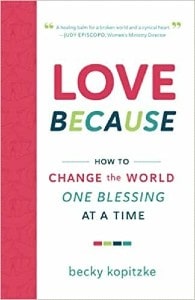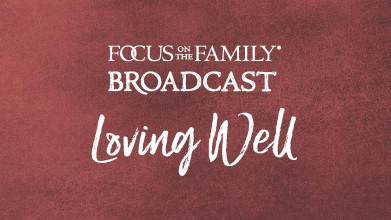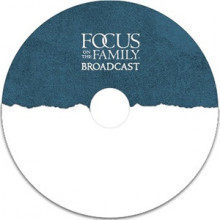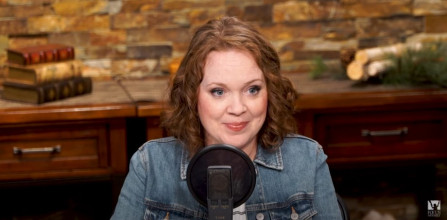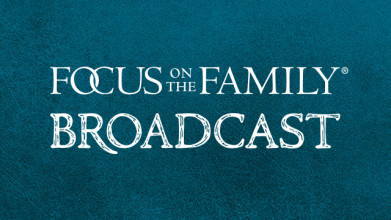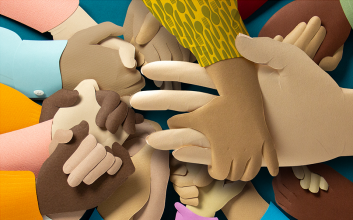Sponsor ID: The following program is sponsored by Focus on the Family and is supported by the prayers and financial gifts of wonderful friends like you.
Preview:
Becky Kopitzke: Jesus said, “This is how the world is gonna know that you belong to me. It’s how you love each other.” I just love that verse from the Bible. That’s John 13:35. I love that God says, “How you love each other is what shows to the world that you belong to me.” It’s n- not necessarily how much you love God, how much you read your Bible. I mean, that’s all part of it, absolutely, but what shows the world that we belong to Jesus.
End of Preview
Jim Daly: Yeah.
Becky: How we love each other.
John Fuller: That’s Becky Kopitzke, and she’s with us today on Focus on the Family. We’re so glad you joined us. Your host is Focus president and author Jim Daly, and I’m John Fuller.
Jim: And John, I love hearing stories about how God uses people to bless others. Um, I try to look for that opportunity. I don’t think I do it as often as I should.
John: Mm.
Jim: A, a blessing can be simple and sweet, um, like paying for the person behind you in the drive thru. I have done that a couple of times.
John: I’ve been with you when you’ve done it.
Jim: (laughs)
John: It’s pretty fun.
Jim: It is fun, people’s faces like, “What?” (laughs) Or, it can be, a, you know, life-changing event, like adopting a child out of foster care. I mean, that is a big commitment, and people do it, and God bless them for doing it. Uh, here at Focus on the Family, we want to help your relationship with the Lord be vibrant and thriving, uh, to provide you with the tools you need to get the most out of your Christian life. I mean, that’s a good goal, and, uh, it’s wonderful to receive blessings, but when you bless others, you are aligning with what Jesus identified as the greatest commandment in the New Testament book of Matthew chapter 22, verses 37 through 39. It says this. “You shall love the Lord your God with all your heart, and with all your soul, and with all your mind.” Then, it goes on to say, “This is the great and first commandment,” and a second is like it. “You shall love your neighbor as yourself.”
John: Mm-hmm.
Jim: The first one, I feel like we all can do pretty quickly.
John: Yeah.
Jim: (laughs) “Lord, I love you.” Second one, “Ah, I don’t love my neighbor that much.” (laughs) Right?
John: Not that neighbor.
Jim: Yeah. So, today, we want to remind you that, uh, true blessings and joy come from considering others more important than yourself and offer some really practical suggestions on how you can show love to your neighbor.
John: Mm-hmm. As I mentioned, Becky Kopitzke is with us again. Uh, she’s a mom to Clara and Noelle and coaches’ Christian writers, speakers, podcasters, and other creators. She’s an author, and her latest book is titled Love Because: How to Change the World One Blessing at a Time.
Becky: Thank you so much.
Jim: Becky, welcome back.
Becky: (laughs) Thank you for having me. It’s so fun to be here.
Jim: Yeah, what a great topic, though. You picked a great topic to write on (laughs).
Becky: And it’s one that’s very close to my heart, the-
Jim: Why is that?
Becky: … idea of-
Jim: Why did this kinda capture you?
Becky: Well, I’ll tell you. It started with a conversation I had with a dear friend of mine. Her name is Erin, and she lost her husband and her daughter, tragically, to a shooting that happened in our community-
Jim: Mm.
Becky: … and it was… uh, there was nationwide media buzz around it, but-
Jim: Mm.
Becky: … what people don’t see is the aftermath of that-
Jim: Mm.
Becky: … how people continue to live on, and so several months after the incident, I was at Erin’s house, helping her to clean out some closets, and we were having a conversation about her husband, John, and she was telling me how, the last year of their marriage… They didn’t know it was going to be the last year of their marriage, but… they had been very intentional about blessing one another, about finding ways to show love in action-
Jim: Mm.
Becky: … to each other, and in doing so, their relationship grew because they were thinking less of self and more of the other, and she used this term. She said, “It was like we couldn’t wait to out bless each other.”
John: Mm-hmm.
Jim: Yeah.
Becky: And that just struck me in my seat. I sat there. We were eating lunch, and I looked at her, and I said, “Out bless. That is an amazing concept,” and from there, God would not let it go. I, I kept formulating this thought. What would the world look like, what would my family look like if I intentionally went out of myself to bless them even when I didn’t feel like it-
Jim: Yeah (laughs).
Becky: … even when I thought maybe they don’t deserve it?
Jim: Yeah (laughs).
Becky: (laughs) But what would it look like? And then, if they were to reciprocate, what would that do to change a family, and beyond that, what could that do to change a community? And so that’s where the idea for this book was born, and I was so blessed to get to spend months examining, through scripture and through stories from other people, the real power that we hold in sharing God’s love with other people through simple blessings, which are just love in action, looking-
Jim: Yeah.
Becky: … outside of yourself.
Jim: Let me ask you. Your mentor, Cindy, uh-
Becky: Yes.
Jim: … has set a great example for you. How did she try to be a blessing to her son-in-law? I think that’s a story right out of the book.
Becky: Yes. Oh, I, I love Cindy. She has taught me well (laughs) for many, many years, and her children are now married, and she has grandchildren, and, and she’s been able to speak into my life in so many beautiful ways, and w-… just one of her many nuggets of wisdom was to be a blessing, and that is, that is the, um, I call, call it a mantra or model that she uses in her relationship with her son-in-law and now her daughters-in-law to be a blessing, which means support them, support her… and specifically her son-in-law, support his role as head of his new household and to not be the reason that there is discord in their marriage and to inc-
Jim: Wow. That’s good (laughs).
Becky: (laughing) That’s good, right?
Jim: Yeah.
Becky: And, and what’s so funny is I’m thinking, “How many mothers-in-law actually have that sort of focus in mind?” but I believe that is why Cindy has made it so intentional-
Jim: Mm.
Becky: … because it doesn’t come naturally.
Jim: Right.
Becky: It doesn’t come naturally to want to be a blessing to the other people in your life, to not want… to choose not to step in perhaps when you want to-
Jim: Yeah.
Becky: … in order to enable someone else’s relationship to solidify, so I really a- appreciate that about her.
Jim: Well, that’s one of those great examples where the world will joke about the in-law, right?
Becky: Yes.
Jim: How many mother-in-law jokes-
John: Mm-hmm.
Jim: … exist?
Becky: (laughs) Yes.
Jim: Right? And so you almost step into that relationship with a predisposition toward antagonism-
John: Yeah.
Becky: Yes.
Jim: … rather than, “Okay, I’m gonna make this positive.”
Becky: Yes, and why can’t it be that way?
Jim: And that’s, that’s so critical.
Becky: Ri-… Why can’t it be that way? I already pray in advance for my daughters’ someday husbands, for the parents who are raising those someday husbands, and I already pray, “Lord, let me be a blessing in those relationships.” You know, we don’t know. Eh, you know, b-… my oldest daughter now is 14. I don-… not yet, but-
Jim: (laughing)
Becky: … someday.
Jim: My oldest son’s 21–
Becky: Right (laughs).
Jim: … and it’s not yet. What are you talking about?
Becky: Not yet (laughs). I don’t know when the day comes-
Jim: Yeah.
Becky: … but they’re gonna bring somebody home who’s gonna end up being a part of our family permanently-
Jim: Yeah.
Becky: … and I want to be a blessing to that person.
Jim: And that was tongue in cheek.
Becky: (laughs)
Jim: Trent, go find a nice wife.
Becky: (laughs)
Jim: All right.
Becky: But not yet (laughs).
Jim: Yeah, right. Now’s good. Start courting. You know, uh, I said in the open, blessing can be small and seemingly insignificant. I would think that accumulation is really important.
John: Yeah.
Jim: But you describe a time when your, your husband’s travel mug-
Becky: (laughs)
Jim: … and I love this one ’cause I did this this morning with Jean.
Becky: You did?
Jim: She… w-… you know, we try to preset the coffee, so when we get up, we just hit a button. It’s always nice when that happens, and Jean did that last night, and so I was able to get up, and she had my cup sitting there, but her cup wasn’t there because her cup was in the clean dishwasher, so I… okay, I’m gonna get her cup out since she got my cup out-
Becky: (laughs)
Jim: … and set her up for her little coffee treat after she gets up. I got up first. But, uh, that’s kinda what you’re talking about.
Becky: It’s a simple th-
Jim: What did you do for your husband?
Becky: Well, I’ll tell you what. I walked into the house. It was… I had just done school drop-off. I work from home. I had a ton of deadlines at my desk. Normally, my plan is to just blaze through the kitchen, go to my office, and get some work done, but I turned, and I looked at the sink, and Chad’s favorite travel mug was sitting there. Normally, I would think, “It’s his thing.” I don’t even drink the coffee in the household, so I’ll let him wash it, let him take care of all of the various coffee mugs that he collects around the house.
Jim: That dirty coffee.
Becky: I know, right? (laughs) And… but then, I thought, “Wait a second. M-… I’m standing right here at the sink. I am looking at this mug. What would it hurt to wash it for him? But more importantly, what would it say if I did wash it for him?” It’s, it’s not an idea of, “Well, I guess it wouldn’t hurt if I did this for him,” but what co-… what effect would it have if I did?
Jim: Yes.
Becky: And it was simply a coffee mug.
Jim: Yes.
Becky: A- and I decided to take three minutes out of my day. It’s not a grand gesture. It was-
Jim: (laughs)
Becky: … three minutes standing at the sink. I scrubbed that mug because I knew he wanted to use it.
Jim: That was a good wash.
John: Yeah.
Jim: Three minutes. Man.
John: Lot longer than I spend.
Becky: (laughs) You shoulda seen the coffee mug. It was (laughs)…
Jim: Well, and that’s a great example.
Becky: Right, because what does that say?
Jim: Yeah.
Becky: It’s, it’s not a coffee mug at that moment. It is saying, “This is someone who God gave to me I love dearly,” and if all it takes to show him, to remind him that I was thinking about him, I was thinking about what matters to him is to wash a little mug, then why wouldn’t I do it?
Jim: Yeah, Becky, I’ll answer that question.
Becky: (laughs)
Jim: Because here’s the thing. Um, and i-… I think it comes down to temperament, and I’m not going to stereotype whether this is a, a wife thing or a husband thing ’cause I know, in today’s modern culture, hopefully, we’re all chipping in and doing different things-
Becky: Absolutely.
Jim: … and getting that done, but i-… I think a highly rules-oriented person can talk themselves out of that because, “You know what, I’m kinda training ’em.”
Becky: (laughs)
Jim: It might be the husband. It might be the kids, but you know, “I’m training them to ta-… pick up after their messes, so for me to wash his cup, I would be enabling his bad behavior.”
John: (laughs)
Becky: Mm.
Jim: I’m just saying.
Becky: I… no, I get it.
John: That’s a really logical reason.
Becky: It’s a very logical reason. I have that [crosstalk].
Jim: It’s a very informed question, isn’t it (laughs)?
Becky: (laughs) But it’s true, and this is what we battle in our minds, right?
Jim: Yeah.
Becky: “Well, I, I need to teach them that they need to pick up after themselves,” or I… My daughter was at Bible camp, and in my mind, she needs to figure out how to clean her own room. I’m not gonna touch that room, but what would it say to her if she came back from camp, and I had put the brand-new sheets on her bed, I had made things tidy? What does that say to her?
Jim: Yeah.
Becky: Yeah.
Jim: “I love you.”
Becky: Exactly, and isn’t an I love you just as or perhaps more important than a moment of training in how we live according to our rules and regulations? Love trumps everything.
Jim: Yeah. And I think, I think you would agree that it’s all about the balance of doing that.
Becky: Yes.
Jim: Y- you know, you can also be, um, a person that derives a lot of, uh, self-benefit from doing those acts-
Becky: Uh, right.
Jim: … ’cause it… it’s making you feel good that I’m good.
Becky: Uh, uh, right (laughs).
Jim: Right? It’s making you feel good that I’m so good (laughs).
Becky: That’s the martyr. That’s the martyr mom who says, “Well, I’ve just cleaned the entire house for you people.”
Jim: “Aren’t I a good person?”
Becky: (laughs)
John: Yeah.
Becky: I’m a good person, you should love me”
Jim: You are a good person. That’s wonderful, but if you-
Becky: Yes.
Jim: … if you’re in that spot, you probably aren’t getting credit for that.
Becky: Uh, no, but John.
Jim: (laughs)
Becky: I’ll tell you; I’ll tell you what happens. When we do these small acts of, of kindness, of love, these small gestures, they actually help us stop thinking about the things that annoy us. I could look at my husband’s shoes sitting in the hallways, although more often, I will tell you, it’s my shoes sitting in the hallway (laughs)-
Jim: (laughs)
Becky: … but let’s just use this as an example, a-… you know, and I don’t wanna trip over those shoes, and I can run all sorts of thoughts in my head that say, “Oh, he left his shoes out again, and why isn’t he thinking about me, and why is he being so annoying?” Instead, how about if I took those shoes, and I put them away for him, and then I no longer have anything to complain about, and I’ve just done him-
Jim: Mm.
Becky: … a blessing?
John: Yeah.
Becky: How countercultural is that, though?
Jim: Yeah, I was just gonna insert, guys that have the shoes down, think of your laundry (laughs).
Becky: (laughs)
Jim: W- why we leave it four feet from the, you know, the laundry bin. I haven’t… I… I’m terrible at that.
Becky: Oh.
John: You got a friend that does that, right?
Jim: I’m-
Becky: Right, a very good friend of his.
Jim: … either a very bad basketball player-
John: (laughs)
Jim: … or, you know, I just leave it there and assume somebody’s gonna pick it up and put it in there.
Becky: (laughs) Well, my husband is more likely the person to do our laundry.
Jim: Hmm.
Becky: So, I appreciate that about him.
John: Yeah.
Becky: In which case-
Jim: Oh, stab me in the heart (laughs).
Becky: … I… but what do I do? I complain that he’s shrunk something. Come on. Really? Because he was being kind. He was going out of his way to think about us.
Jim: Okay.
Becky: So, how we receive another person’s blessing is also a big part-
Jim: Mm.
Becky: … of giving love generously.
John: And it’s okay. I mean, if you hadn’t written about it, would Chad have known that you washed his travel mug, going back to that story?
Jim: (laughs)
Becky: I don’t know.
John: And, and is that all right?
Becky: It is all right because, why?
John: Yeah.
Becky: Why are we doing it? It’s for the other person. It’s to show love and build that relationship. Yes, but ultimately, it is an act of obedience to the Lord-
John: Mm.
Becky: … because the Lord has given us our relationships. The Lord tells us, Jesus said, “This is how the world is gonna know that you belong to me. It’s how you love each other.” I just love that verse from the Bible. That’s John 13:35. I love that God says, “How you love each other is what shows to the world that you belong to me.” It’s n- not necessarily how much you love God, how much you read your Bible. I mean, that’s all part of it, absolutely, but what shows the world that we belong to Jesus.
Jim: Yeah.
Becky: How we love each other.
Jim: Mm. That’s good.
John: That is really good stuff from Becky Kopitzke on today’s episode of Focus on the Family, and her book is called Love Because: How to Change the World One Blessing at a Time, and, uh, we really do encourage you to get this book and to follow these simple steps to really be a blessing for God to others. We’ve got copies of that here at focusonthefamily.com/broadcast, or call 800, the letter A, and the word FAMILY.
Jim: Becky, you lay out, um, the blessing toolbox. I like the imagery of that.
Becky: Yeah.
Jim: I’m just wondering what’s in the box (laughs).
Becky: Yeah, in the box.
Jim: So-
Becky: Well…
Jim: What are some principles? I guess those would be principles we need to-
Becky: Yeah.
Jim: … keep in mind as we set out to bless those around us.
Becky: Sure.
Jim: What’s in the toolbox?
Becky: Well, if you think about it, if you’re gonna build something, you need tools, right? So, we’re trying to build these relationships so we can find-
Jim: I don’t (laughs).
Becky: (laughs)
Jim: I can’t build anything.
John: He hires people with tools.
Jim: I can’t build anything, so-
Becky: So, what do they have in their toolbox?
Jim: Yeah, okay, I look at their toolbox, but wow, I wish I knew how to use that.
John: (laughs)
Becky: Yeah (laughs).
Jim: So, anyway, back to the hammer and the saw.
Becky: Right, so I identify eight core principles that we need to have in our toolbox in order to really bless people well. And the first one, the top one, is to remain in that vine, you’ve gotta remain close to God because we can’t pour out what hasn’t first been poured into us, so when we remain close to the Lord, and we’ve got his love in our hearts, and we… and, and we are remembering what he wants from us, so much more natural for that to pour out.
Jim: Right.
Becky: And then, start with your Jerusalem. There is a, a story in the book of Acts where Jesus is… has just given the great commission to his disciples, and he’s telling them now, “Go out and be my witnesses in Jerusalem, and Judea, and Samaria, and to the ends of the Earth.” Start with your Jerusalem, and that’s your home.
Jim: Ah.
Becky: It’s your home. The whole idea of wanting to go out, and, and bless all the world and, and work for Jesus, and, and touch strangers’ lives is beautiful, but if you’re doing that at the expense of your central family, that’s not how God designed it.
Jim: Let me… Before you move through the other tools, let me ask you right there.
Becky: Yeah.
Jim: Um, and we’ve experienced this, to be fair. Jean’s got a tremendous heart to help people. I can remember a couple of years ago. I mean, she just had a lot of friends that were having surgery, or something was going wrong, and-
Becky: Yeah.
Jim: … I think one week, I mean, she provided five meals for others, and that meant cooking starting about 3:00-
Becky: Yeah.
Jim: … and then driving it over and getting home about 6:30 or 7:00 ’cause, you know, she caught the mom on the porch, and they started talking, and I’m going, “Well, I guess it’s hot dog, boys.”
John: (laughs)
Becky: (laughs) I know, exa- exactly. It’s hot dogs.
Jim: Listen. Of course, the boys are going, “Hot dogs again, dad?” and, uh, not that I can’t cook dinner. I don’t wanna give that impression, and… but Jean normally cooks dinner. I do breakfast on the weekend.
Becky: Yeah.
Jim: But but speak to that, that conflict. Again, it’s back to balance.
Becky: It is.
Jim: But you can have a lot of things go down with your friends all at once, and then you’re-
Becky: It’s true.
Jim: … pulled on.
Becky: It’s true.
Jim: And so your family’s not first.
Becky: It’s true, and there used to be-
Jim: And, and I think husbands, too, I think… I’m sorry (laughs). It’s not that I’ve lived this or anything.
Becky: No (laughs).
John: This is a personal session for you, Jim.
Jim: But I think, think with, I think with husbands, too, we gotta-
Becky: I gotta meet Jean.
Jim: We gotta put our own selfishness down a bit-
John: Mm-hmm.
Jim: … right, and realize that our wife is blessing somebody-
Becky: Yes.
Jim: … and we need to support her in that.
John: Yeah.
Becky: A- and I think it goes both ways s- s-… husbands, wives. We’ve got to have open communication about the needs that are happening on any particular day, any particular week, and, and Chad and I call this checking in with each other. So, in the morning or the night before, “What do you have going tomorrow?” A-… you know-
Jim: Four meals (laughs).
Becky: (laughs) Yeah. Right. Hot dogs.
Jim: (laughs)
Becky: That’s what I got going. Uh, and so we just need to make sure we’re, first of all, communicating. You know, “Well, my friend has this need, and so I really wanna be able to meet with her. Can, can we work with that?” I- sometimes it means I may not be home until such hour.
Jim: Right.
Becky: “Are you okay with that?” So, just open communication, I think, can help-
Jim: Mm.
Becky: But then, just, just keeping our priorities straight and identifying when all of the serving elsewhere ev-… it’s not necessarily even friends in need but maybe the a-… ministry that you’re doing at church, the volunteer work that we’re doing for local community, uh, agencies. At what point is the family sacrificing you and all of your doing good things for other people, which means, at that point, is it time to scale it back and recognize it’s time to focus on that family first because-
Jim: I like that word, by the way.
Becky: (laughs)
Jim: It’s a nice phrase.
Becky: Focus on the family-
Jim: (laughs)
Becky: … first (laughs). Slid that in there.
Jim: But that’s good. So, w-… d-… moving through that, Jerusalem, take care of your family.
Becky: Yes.
Jim: Make sure you’re blessing them as well. What’s next?
Becky: Absolutely. Um, well, first of all, uh, no blessing is too small.
Jim: Right.
Becky: Right? So, again, we… you don’t need to go on some tropical vacation. You don’t need diamond earrings. It’s the little things that really add up, and that’s what defines a relationship long term, and then be a cheerleader. I-… words are so important. Words are so important, so encouragement goes a long way, how we’re using our words, how we’re using our tone of voice, and then play the right tapes. And I mentioned earlier, if I’m gonna sit and stew over my loved ones’ h-… annoying habits, those annoying habits are going to be a lot more prevalent in my life, but instead, can I stop and think about all the things that I love about that person, all the things that he or she does well? So, ho-… what are we allowing to stew in our minds? And then, forgive quickly. Just forgive quickly. That is such an important principle for Christians in general, um, and because forgiveness leads to compassion. My pastor says, “Keep short accounts.” That’s how he says it. Keep short accounts. And then, um, show the real you. You know, I (laughs) I, I almost posted something on Instagram recently that was just m-… um-
Jim: (laughs)
Becky: … family in a, in a difficult moment, but… because, why? We don’t need to see people’s flashy, fancy, perfect lives. Uh, our true ministry is filled with honesty in which people can relate to how you are also struggling with something. There was one Christmas when I was looking at everybody else’s beautiful family photos in front of the Christmas tree, and everybody was smiling.
Jim: (laughs)
Becky: And so, I posted my post-Christmas gift-opening shrapnel, literally.
Jim: (laughs)
Becky: Yes, this is, this is my life on Christmas. Can anybody relate? And so many people came in and said, “Yes, that’s my house, too.” So, just being real and genuine, I think, really helps to bless people, to help them feel like they are not alone. And then finally, and this one, I will stand on because I did it the wrong way for a long time is to take care of yourself first.
Jim: Yeah.
Becky: I don’t mean first as in you are more important, but self-care is what enables us to pour into other people.
Jim: Uh, you lay out the four Ps of blessing. What are those? I mean, we’re into the practical nature of what you’re talking about here.
Becky: Yeah, so I think of these as four categories of ways that we can bless people. Bless with your presence. Be available to people. Even if you’re not physically present, phone calls, uh, you know, zoom calls (laughs), sending a gift, that’s blessing with your presence. Blessing with your possessions. It doesn’t necessarily mean writing a check. I mean this kindly, but sometimes writing a check is the easy way out. Are you willing to give of yourself to give of your, your time and your goods to really serve another person? Um, and does… It’s as simple as my friend Alisha gave a cup of coffee to a homeless man, had a wonderful conversation with him and discovered he was listening to worship music, and she felt so cut to the quick from that, you know. She, she thought she was serving him, but in the end, he served her with-
Jim: Yeah.
Becky: … a wonderful lesson, so our presence, our possessions, our perspective. Are we looking at other people the way God looks at them, or are we judging based on appearances?
Jim: Yeah, that is so hard.
Becky: It is very hard.
Jim: Yeah.
Becky: And so, you can bless people simply by having the right perspective of them as being someone that God created and someone God loves. And then, prayer is such a huge way to bless people. Even when you feel like there’s nothing else you can do, prayer should always be first anyway. It is the one blessing that directly invokes the action of God.
Jim: Mm. That’s good.
Becky: Yeah.
Jim: In that possession category, you had a situation where you were blessed, and that sometimes is-
Becky: Yes.
Jim: … a little uncomfortable, but it was a big thing, right? Your-
Becky: It is.
Jim: … girls were not happy perhaps with their little piano.
Becky: Yes. This was back when-
Jim: (laughs)
Becky: … my girls were… they were, um, just starting to take piano lessons, and they were becoming skilled enough they needed a really good instrument, and they were still working on my 20-year-old weighted keyboard that I had gotten for a college graduation gift. It was not ideal for them to learn acoustic piano. And so, I was talking about it backstage. I’m on the worship team at my church, and the bass player happened to overhear me, and he sent an email later in the week and said, “I, I heard you’re looking for a piano. I happen to have mine. My kids are grown.”
Jim: (laughs)
Becky: “They’re gone from the house.”
Jim: I have it right here in my back pocket (laughs).
Becky: “I’ve got it right here in my pocket.”
Jim: (laughs)
Becky: (laughs) But he said, “We’re moving, and we don’t have a need for the piano. Would you like to, have it?”
John: Wow.
Jim: Mm.
Becky: And it was such a tremendous blessing, and now my girls have been playing on that piano for years, and, uh, it, it spoke to a direct need of mine and was given in such a selfless way, and he was so humble about it. Other people had offered to sell us their pianos, and that would’ve been wonderful, too, but he just said, “You know what? I recognize the need here. I don’t need it. God blessed me with it. He blessed us with this excellent new house, and we don’t have space for the piano. I want you to have the piano.”
Jim: Yeah. W-… one of-
Becky: Yeah, it’s beautiful.
Jim: … one of the Ps you’re mentioning is, uh, perspective, and it’s funny. How can I bless another person with my perspective (laughs)?
Becky: (laughs)
Jim: I tend to over bless people with my perspective (laughs).
John: You’re very enthusiastic and optimistic. It’s a good thing.
Jim: So, uh, straighten me out here. What do you mean by blessing with your perspective?
Becky: We’ll, primarily, what I mean there is seeing people as someone that God created, has as much value and, um, is worthy of as much respect as you are, as the people in your circles are, and if that person looks different, if that person speaks different, if that person has differing opinions, that person is still worthy of respect and dignity-
Jim: Mm.
Becky: … because, like you had said earlier, we’re all created in the image of God. And it’s funny because my senior pastor was one who (laughs) really pointed this out to me and told me a story of how that went to the grocery store, and he’s a, he’s a really straight-talking Italian guy.
Jim: (laughs)
Becky: I love our pastor, and he was in a hurry, and there was a gal in front of him in the checkout line just taking her time, being chatty with everybody, and who’s being very friendly, and he’s, he’s thinking, “Come on, now. We, we got places to go,” and, and, as he said, she was all tatted up, and she’s got earrings everywhere and not in her ears, and so he formed a judgment. And she turned around, and she saw him, and he said there was a look on her face, and she said, “Pastor. How fun to see you. I just loved your sermon on Sunday.”
Jim: Whoa.
Becky: And he said he was absolutely crushed and realized this is what we’re talking about. We’ve got to see people the way God sees them, not the way we want to see them with our fast judgments because, otherwise, as he said, we’re out of play.
Jim: Yeah.
Becky: We can’t be witnesses in this world if we’re judging people on appearances.
Jim: Assumptions are deadly.
Becky: Yes.
Jim: Social media’s full of assumption-
John: Mm-hmm.
Becky: It’s a… yes.
Jim: … and it’s just… it’s a killer to the human spirit-
Becky: It is.
Jim: … and to community, for sure.
Becky: It is.
Jim: Let me ask you to… Uh, Becky, we kinda touched on this, but that person that perhaps has a small circle of friends or maybe not many at all, and you know, they feel like, uh, “I don’t have that. I don’t have the blessing of blessing (laughs) others.”
Becky: Yeah.
Jim: It reminds me of a conversation I had with a Christian leader one time, and it was funny ’cause we were talking about the fruit of the spirit-
Becky: Yeah.
Jim: … you know, and love, joy, peace, goodness, all of that, and patience, and he actually said, “Well, I just, you know, I just don’t have patience.”
Becky: (laughs)
Jim: And I said… I remember just thinking it. I said this out loud. I can’t believe I did this, and I said, “Well, I d-… I don’t think it’s like a menu you order from.”
Becky: (laughs) It’s not.
John: (laughs)
Jim: (laughs) I mean, i- if you’re a Christian, and-
Becky: Yes.
Jim: … you’re in him, then these things should be present in you.
Becky: Yes.
Jim: And if it’s not there, that is something to work on, not to say-
Becky: Yes.
Jim: … “Oh, you know what? God didn’t give me that.”
Becky: Yeah (laughs).
Jim: “He didn’t give me mashed potatoes.”
Becky: Exactly. Right?
Jim: (laughs)
Becky: I just… I don’t feel like eating the broccoli today-
Jim: Right.
Becky: … so I… It’s so true, and patience is one of the fruits that I like to say doesn’t grow too hot on my tree, but-
Jim: (laughs)
Becky: … I know it’s still there, and we have access to it-
Jim: Yeah, right.
Becky: … because believers have fruit of the spirit. I think the same thing of kindness. Kindness is fruit of the spirit, so Christians have access to it in ways the rest of the world doesn’t.
John: Mm-hmm.
Becky: There’s a difference between being nice and being kind.
John: Mm.
Becky: Kind comes straight from God.
John: Mm.
Jim: And that’s so well said, and I think that is the purpose of even having you here today, Becky. At first, I was thinking this is kinda, like, we all know how to bless people-
Becky: Yeah.
Jim: … but this has been so informative and so good and challenging, honestly.
Becky: Yes. We actually really stink at blessing people (laughs).
Jim: (laughs)
John: (laughing) Right.
Jim: I wasn’t gonna say it that way (laughing).
Becky: Oh, is it just me?
Jim: But it’s true. It’s true. We’re not as… Well, y-… we can only speak for ourselves.
Becky: Yeah.
Jim: So, you know, I d-… I don’t think I’m as intentional as I should be at times.
Becky: Mm-hmm.
Jim: And of course, we’re always gonna get busy, and there’s 100 reasons why you miss blessing somebody-
Becky: Yeah.
Jim: … but like that comment about thinking the best of your spouse, um, why not think the best of, “Lord, let this see where I can bless another person”-
Becky: Yes.
Jim: … and wake up with that prayer on your lips, right, for the day?
Becky: Yes.
Jim: That would be awesome.
Becky: Yes.
Jim: Well, you’ve done a wonderful job-
Becky: Oh, well, thank you.
Jim: … expressing this, Becky.
Becky: Thank you.
Jim: And it’s so wonderful to see you again, uh, your book Love Because: How to Change the World One Blessing at a Time.
Becky: Mm-hmm.
Jim: And you’ve just given us so many great little insights. Make sure your family feels blessed. Make sure your friends are blessed. Make sure you’re thinking of a v- variety of ways to do that, and we’ve only really scratched the surface of-
Becky: Absolutely.
Jim: … your book. Um, and let me say, uh, a way to bless each other, if you can join us in the ministry here at Focus on the Family, send a gift of any amount, and we’ll send you Becky’s book as our way of saying thank you and blessing you right back, and, uh, it’s a wonderful way to, um, bless one another.
John: Mm-hmm. Get in touch. Uh, make a donation as you can, and request Becky’s book, and you can do that by going to focusonthefamily.com/broadcast, or call 800, the letter A, and the word FAMILY, 800-232-6459. Well, join us again tomorrow. We’ll hear a classic presentation from Corrie ten Boom, who saved 800 Jewish refugees from the Nazis during World War II. She’ll share how she was able to expand forgiveness to the man who betrayed her to the Gestapo.
Preview:
Corrie ten Boom: And that man wrote me, “That you could forgive me is such a great miracle. Your forgiveness has shown me what it means that there is forgiveness through Jesus Christ.”
End of Preview












